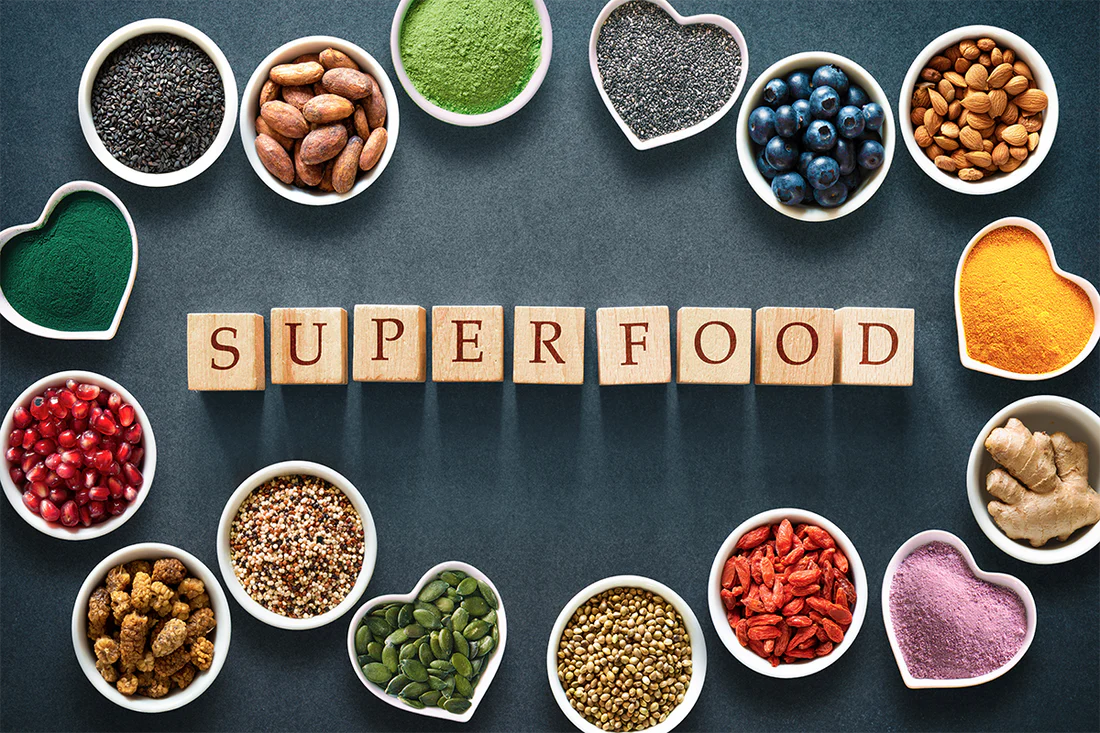Introduction to Superfood
When it comes to achieving everyday wellness, what we put on our plates can make all the difference. The buzz around “superfoods” is not just hype; these nutrient-packed foods can supercharge your body, mind, and overall well-being. Whether you’re looking to boost energy, improve immunity, or simply feel better, superfoods are the answer. But what exactly are they, and why should they earn a spot in your daily routine? Let’s dive in.
Table of Contents
What Are Superfoods?

Superfoods are nutrient-dense foods celebrated for their exceptional health benefits. These natural foods are packed with vitamins, minerals, antioxidants, and other nutrients that help the body function optimally. From leafy greens to vibrant berries, superfoods are Mother Nature’s way of delivering a health boost in every bite.
Key Characteristics of Superfood:
- High in essential nutrients
- Rich in antioxidants to combat free radicals
- Often low in calories but high in benefits
Examples include berries, leafy greens, and nuts, all of which can transform your diet.
So, what makes a food “super”? It’s all about nutrient density. Foods like kale, quinoa, and chia seeds have a high concentration of nutrients compared to their calorie content. This makes them a go-to choice for improving overall health and preventing chronic illnesses.
Why Are Superfoods Important for Health?

Imagine your body as a car; it requires premium fuel to run smoothly. Superfoods act as that premium fuel, providing essential nutrients that not only improve bodily functions but also help combat diseases, enhance energy, and support mental clarity.
Consuming superfood regularly can lead to a reduced risk of heart disease, improved digestion, and even healthier skin. They’re versatile, easy to incorporate into meals, and offer a natural way to supercharge your wellness.
Key Benefits of Incorporating Superfood
Boosting Immunity
Your immune system is your body’s first line of defense, and superfoods like citrus fruits, garlic, and ginger are rich in immune-supporting vitamins like C and E. These foods help fight off infections and keep illnesses at bay.
Enhancing Energy Levels
Tired of feeling sluggish? Superfoods like bananas, nuts, and quinoa are packed with complex carbohydrates, healthy fats, and protein. These nutrients provide sustained energy without the dreaded sugar crash.
Supporting Mental Clarity
Want to stay sharp and focused? Superfoods such as walnuts, blueberries, and fatty fish like salmon are loaded with omega-3 fatty acids and antioxidants. These compounds are essential for brain health and improving cognitive function.
Top Superfoods to Add to Your Diet

Here are some must-have superfoods that are easy to add to your daily diet:
Fruits:
- Blueberries: A powerhouse of antioxidants that improve brain function.
- Avocado: Packed with healthy fats that support heart health.
- Pomegranates: Great for reducing inflammation and improving skin health.
Vegetables:
- Kale: A versatile leafy green rich in Vitamin K.
- Spinach: Loaded with iron and calcium for strong bones.
- Sweet Potatoes: High in beta-carotene, essential for eye health.
Grains:
- Quinoa: A gluten-free, protein-rich grain that is perfect for any meal.
- Oats: A breakfast staple known for lowering cholesterol.
- Chia Seeds: Tiny but mighty, these seeds are full of Omega-3s.
Proteins:
Greek Yogurt: A protein-packed snack that aids digestion.
Salmon: A top source of lean protein and Omega-3 fatty acids.
Eggs: Affordable, versatile, and packed with nutrients.
Superfood for Specific Needs
Did you know superfood can target specific health goals? Let’s explore how:
1. Weight Management:
- Foods like chia seeds and oats keep you feeling fuller longer.
- Incorporate avocados for healthy fats that curb hunger.
2. Heart Health:
- Berries and salmon are known to lower bad cholesterol and support heart function.
3. Skin Rejuvenation:
- Pomegranates and walnuts promote glowing, youthful skin.
4. Gut Health
Yogurt: The Probiotic Powerhouse
Yogurt is one of the best-known gut-friendly superfood. Packed with probiotics—live bacteria that support a healthy digestive system—yogurt can help balance your gut microbiome, which is essential for digestion and immunity. Choose plain, unsweetened yogurt to avoid added sugars, and consider options with active cultures like Greek yogurt. It’s versatile too! Add it to smoothies, use it as a base for dressings, or simply enjoy it with fresh fruit.
Sauerkraut: The Fermented Wonder
This tangy, fermented cabbage dish is a gut-health superstar. Sauerkraut is rich in probiotics, vitamins C and K, and dietary fiber, which aid digestion and promote healthy gut bacteria. Its fermentation process enhances nutrient absorption and supports your immune system. Add a scoop to your meals as a condiment or snack on it straight to give your gut a quick boost.
5. Stress Relief
Dark Chocolate: The Mood Enhancer
Good news for chocolate lovers! Dark chocolate, particularly varieties with 70% or higher cocoa content, is rich in flavonoids, which reduce stress hormones and improve mood. It’s also a source of magnesium, a mineral known to promote relaxation. A small piece of dark chocolate daily can do wonders for your mental well-being.
Green Tea: The Calming Antioxidant
Green tea is a soothing beverage loaded with antioxidants like catechins, which combat oxidative stress. It also contains L-theanine, an amino acid that promotes relaxation without drowsiness. Sip a cup during stressful moments to enjoy its calming effects and health benefits.
6. Muscle Recovery
Salmon: The Omega-3 Champion
After an intense workout, your muscles need repair and nourishment. Salmon is packed with protein for muscle recovery and omega-3 fatty acids to reduce inflammation. Grill, bake, or poach salmon to create a post-workout meal that supports strength and endurance.
Sweet Potatoes: The Carb King
Sweet potatoes are a powerhouse of complex carbohydrates, which replenish glycogen stores after exercise. They’re also rich in potassium and vitamin A, supporting muscle repair and reducing cramps. Roast them, mash them, or turn them into fries for a delicious recovery meal.
Superfood for Busy Lifestyles

Busy day? No problem. Superfoods like almonds, dried fruit, and protein bars are perfect grab-and-go options. Keep a stash in your bag for when hunger strikes, and you’ll avoid unhealthy snacks.
Portable Superfoods:
- Nuts and seeds: Perfect for snacking.
- Fruit like bananas or apples: Easy to carry and eat.
Superfood Snacks:
- Granola bars made with oats and chia seeds
- Greek yogurt with a drizzle of honey
Common Myths About Superfoods
Addressing Misconceptions
Superfoods are often marketed as magical cures for all health issues, but that’s far from the truth. A common myth is that eating one specific superfood, like kale or blueberries, will single-handedly transform your health. In reality, no single food can replace a balanced diet or make up for unhealthy eating habits. Another misconception is that superfoods must be exotic or expensive. While acai berries and goji berries are trendy, local options like spinach or apples are just as beneficial.
The Role of a Balanced Diet
Superfoods should complement, not replace, a diverse and balanced diet. For maximum benefits, combine superfoods with other nutrient-rich foods like lean proteins, whole grains, and healthy fats. Remember, it’s the synergy of different nutrients that optimizes your health—not one miracle ingredient.
Budget-Friendly Superfood Options
Affordable Alternatives
Think superfoods are out of your budget? Think again. Instead of pricey chia seeds, opt for flaxseeds, which are equally rich in Omega-3s. Swap exotic fruits for budget-friendly bananas, which are loaded with potassium and energy-boosting carbs. Lentils and beans, often overlooked, are protein-packed powerhouses that won’t break the bank.
Tips for Shopping Wisely
- Buy in bulk: Nuts, seeds, and grains are cheaper when purchased in bulk.
- Choose frozen: Frozen fruits and vegetables retain their nutrients and are more affordable than fresh options.
- Shop local: Seasonal and locally grown produce is often cheaper and fresher.
How to Incorporate Superfoods into Your Meals
Breakfast Ideas
- Overnight oats: Combine oats, chia seeds, and almond milk for a nutrient-packed start.
- Smoothie bowls: Blend spinach, blueberries, and Greek yogurt, then top with granola and nuts.
- Avocado toast: Add a sprinkle of chia seeds for an extra boost.
Lunch and Dinner Suggestions
- Quinoa bowls: Toss quinoa with kale, sweet potatoes, and grilled chicken.
- Salmon with greens: Pair baked salmon with a side of steamed spinach or kale.
- Superfood stir-fry: Use broccoli, carrots, and tofu with a sprinkle of sesame seeds.
Smoothies and Snacks
- Green smoothies: Blend spinach, banana, and flaxseeds for a quick nutrient boost.
- Trail mix: Mix almonds, dried cranberries, and dark chocolate chips.
- Greek yogurt parfaits: Layer yogurt with granola and berries.
Superfoods for Children
Kid-Friendly Options
Getting kids to eat superfoods can be tricky, but it’s not impossible. Opt for naturally sweet options like blueberries and bananas, or make kale chips for a crunchy snack. Yogurt-based smoothies with hidden spinach or chia seeds are a hit with many kids.
Tips for Picky Eaters
- Disguise the taste: Add spinach to pasta sauces or bake sweet potatoes into muffins.
- Make it fun: Serve fruits and veggies in fun shapes or colorful combinations.
- Start small: Introduce one new food at a time to avoid overwhelming them.
The Role of Hydration and Superfoods

Hydrating Foods
Certain superfoods also contribute to hydration. Foods like watermelon, cucumbers, and celery are over 90% water and help maintain fluid balance in your body.
Importance of Water with Superfoods
Staying hydrated amplifies the benefits of superfoods. Water aids in digestion, helps your body absorb nutrients, and ensures that you feel energized throughout the day. Pair hydrating foods with your meals for a double benefit.
Potential Risks and Allergies
Knowing Your Body’s Limits
Even superfoods can pose risks if overconsumed. For example, too much kale may interfere with thyroid function in some individuals, and excessive chia seeds can cause digestive discomfort. It’s essential to eat a variety of foods and not rely on one type for all your nutritional needs.
Consulting a Professional
Before drastically altering your diet, consult a healthcare provider or nutritionist, especially if you have allergies, intolerances, or underlying health conditions.
Superfoods and Sustainability
Ethical Considerations
Many trendy superfoods, like quinoa and avocados, are sourced from regions where their popularity has impacted local communities and ecosystems. Be mindful of where your food comes from and consider the environmental footprint of your choices.
Choosing Sustainable Options
Support local farmers and opt for seasonal produce when possible. Alternatives like locally grown spinach or berries can offer similar nutritional benefits with less environmental impact.
DIY Superfood Recipes
Quick and Easy Recipes
- Berry Smoothie: Blend frozen blueberries, almond milk, and flaxseeds.
- Kale Chips: Toss kale leaves with olive oil and bake until crispy.
- Chia Pudding: Combine chia seeds, coconut milk, and a dash of honey, then refrigerate overnight.
Ideas for Every Meal
- Breakfast: Avocado toast with a poached egg.
- Lunch: Quinoa salad with roasted vegetables.
- Dinner: Baked salmon with a side of sweet potato fries.
Conclusion
Superfoods are not just a trend—they’re a way to fuel your body with essential nutrients and promote long-term wellness. From boosting energy to enhancing mental clarity, the benefits are undeniable. Start small, try one or two superfoods at a time, and experiment with recipes to find what works best for your lifestyle. Remember, the key is consistency and balance.
Frequently Asked Questions
1. Are superfoods better than regular foods?
Superfoods are nutrient-dense but shouldn’t replace a balanced diet of regular healthy foods.
2. Can I eat superfoods every day?
Yes! Incorporate a variety of superfoods in moderation for optimal benefits.
3. Are there any side effects of superfoods?
Some superfoods can cause allergies or digestive issues if overconsumed, so moderation is key.
4. How do I make superfoods kid-friendly?
Use creative recipes like smoothies, muffins, or colorful salads to make them appealing to kids.
5. Are frozen superfoods as good as fresh ones?
Yes, frozen fruits and vegetables retain their nutrients and are a great budget-friendly option.






